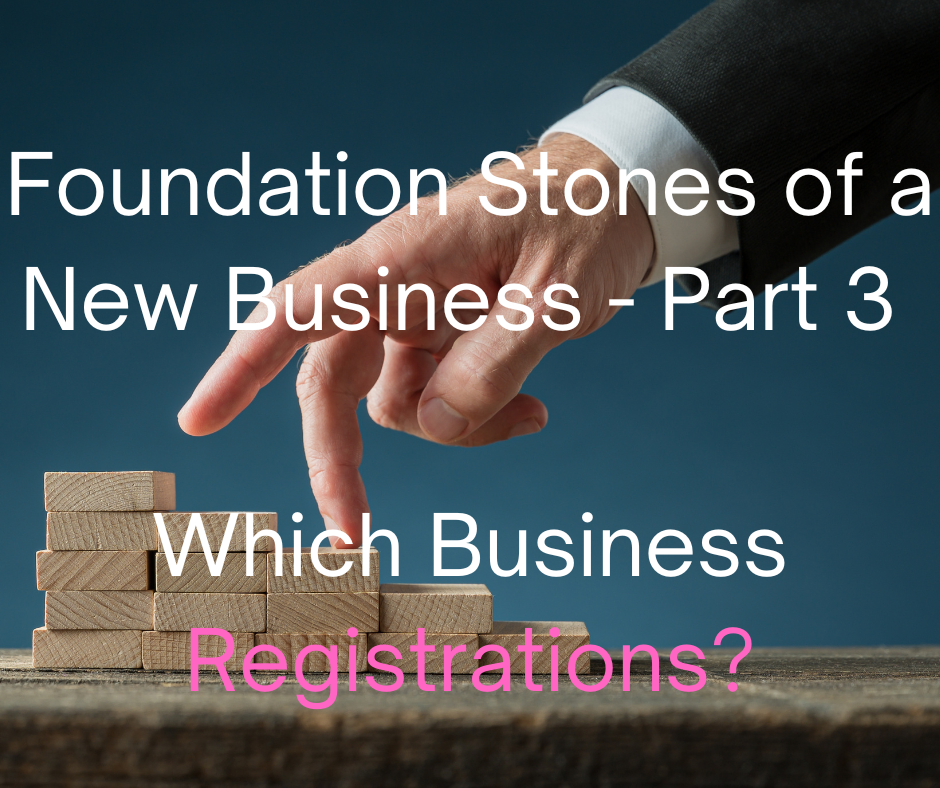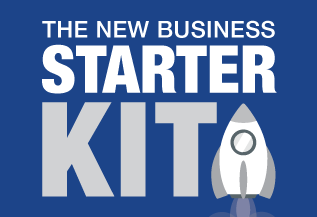The Foundation Stones Of A New Business (Part 3) The Right Business Registrations

It’s exciting when you have that light bulb moment, that flash of brilliance and idea for your new business. It’s hard not to get carried away with the excitement but turning your idea into a business necessitates research, risk, passion and planning. There are very few shortcuts and no amount of enthusiasm, hard work or talent can guarantee your business success.
There are numerous issues you need to address before you can open your doors and you have to navigate your way through a maze of rules and regulations. Having mentored hundreds of business owners through the start-up phase we often say starting a business is like building a house. You need to have a plan and build on solid foundations. In a business sense this means things like having the right business structure, branding, accounting software and insurances. You also need a financial budget and a marketing plan.
In this series of articles we are examining the 8 foundation stones for a new business and the focus of this post is the right business registrations.
As a new business owner you need to ensure that the business is complying with all the tax and registration requirements imposed by governments, local councils and industry bodies. Failure to register within the permitted timelines could also result in penalties and fines. While this article is not intended to be an exhaustive list of registrations, it does provide some of the more common requirements.
Tax File Number (TFN) is a basic requirement for completing your annual Income Tax Return. Sole traders can use their personal TFN for both their business dealings and their personal dealings with the Tax Office. Partnerships, Companies and Trusts are required to have a separate TFN. This can be obtained at the same time as you apply for an Australian Business Number (ABN).
Australian Business Number (ABN) is compulsory for all businesses and you need an ABN to:
- Register for GST, PAYG Withholding, Fringe Benefits and other taxes
- Deal with other businesses where your ABN must be quoted
- Avoid having amounts withheld from payments to you from other businesses
We can apply for an ABN and TFN on your behalf. Alternatively, go to the Australian Business Register website and follow the directions. If you are a registered Company with an Australian Company Number (ACN), your ABN will usually be your ACN with two extra digits at the beginning.
Goods & Services Tax (GST) You are required to register for GST if either of the following apply:
- Your current or projected annual turnover is $75,000 or more (As soon as you know your turnover is $75,000 or more, you have 21 days to register.)
- You are a Taxi, Limousine or Hire Car Operator, regardless of your annual turnover
- If you want to claim fuel
tax credits
Like your ABN and TFN applications, registering for GST can be completed through our office or at the same time on the Australian Business Register website. Your ABN will also be your GST registration number. Registering for GST means you are required to complete a Business Activity Statement (BAS) at the end of each tax period. Small businesses generally lodge quarterly, but you can choose to report monthly to the Tax Office.
| Due Date for Each Quarterly BAS |
||
| Quarter |
Due Date |
|
| 1 - July, August and September |
28 October |
|
| 2 - October, November and December |
28 February |
|
| 3 - January, February and March |
28 April |
|
| 4 - April, May and June |
28 July |
|
If you lodge your quarterly activity statements online, you may be eligible for a two-week extension.
Do You Need to Register for PAYG Withholding?
If you have employees, you must register for PAYG Withholding and withhold amounts including:
- Income Tax for employees (including working Directors of a Company)
- Withhold 46.5% from payments to suppliers who cannot quote an ABN
Before you withhold any payments, you need to register for PAYG Withholding. Like your GST registration, this can be completed at the same time and means that you will have either quarterly or monthly reporting requirements.
If you are a Sole Trader or Partner, the Tax Office do not regard you as your own employee. You ‘draw’ money from the business to live on but this is not technically seen as normal ‘salary and wages’. As such, there is no need to register for PAYG Withholding and withhold amounts from your drawings unless the above examples apply.
If you employ staff, you will also need to have a payroll system in place that produces pay slips plus you will need to register for:
- Workers Compensation Insurance ((WorkCover in Victoria) and
- The Superannuation Guarantee for your Employees
Generally, if you pay an employee $450 or more (before tax) in a calendar month, you have to pay Super Guarantee (SG) on top of their wages. If your employee is under 18 or is a private or domestic worker, such as a nanny, they must also work for more than 30 hours per week to qualify. You have to pay super for some contractors, even if they quote an Australian Business Number (ABN).
Registering Your Business Name
Business Names and Company Names are registered with the Australian Securities & Investments Commission (ASIC). It is common for a Company to register a business name to be used as a trading name.
Unless you plan to run the business under your personal name or your business partner’s name (like Tony Smith), or initials and surname (like T. Smith), you need to register a separate business name. Your business name will be important for identifying and promoting the business, so you should consider choosing a unique name that distinguishes you from your competitors.
When deciding on a business name you should consider:
- Whether you want to be at the top of the alphabetical listings (AAA Plumbing)
- Clever contractions like Vodafone (from voice, data & telephone)
- Catchy names (Drips Plumbing, Blockbuster Video)
- Foreign Words – Reebok (an African Antelope)
- Make up a word (Coca-Cola)
Your next step is to check the availability of the business name. The quickest way of doing this is an online check with the Australian Securities and Investments Commission (ASIC) - Check Name Availability Page. You might also need to check with IP Australia - Australian Trade Marks Online Search System to check that your name is not infringing a registered or pending trade mark
To register your business name online, go to the ASIC website, follow the prompts and pay the fee. It is less than $100 to register the name for 3 years. Note that the business name fee is not a one-off payment and to stay active you need to renew it every three years.
Your Australian Company Number (ACN)
If you register a Company, you will be issued with a 9-digit Australian Company Number (ACN). This is your unique identifying number to be used when the company deals with other businesses, individuals and Government agencies. The ACN must be displayed on all your public documents, such as invoices and receipts.
NOTE: Your ACN is not the same as your ABN and they should not be confused.
Protecting your Business or Company Name & Web Address
When you start a new business, register a new name or develop a new product you should consider protecting your intellectual property (IP). Even though a new business name has been registered with Consumer Affairs Victoria, if it is not protected, a competitor can still legally register:
- a similar Company name with ASIC
- a similar Trade Mark with IP Australia
- the same Business Name in another state or territory
- a similar Domain Name
The main ways of providing Australia-wide protection are:
- Trade Mark Protection - Registering your business or Company name as a trade mark gives you legal ownership rights to the name across Australia and prevents others from trading under it. A trade mark can be a letter, word, phrase, number, sound, scent, logo or image. It can be an effective marketing tool, making a business stand out from the competition. To find out about the trade mark application process, go to ‘Trade Marks’ on the IP Australia website.
- Domain Name Protection - The domain name is the main part of a web address (URL) that follows ‘www’ and is used to identify the location of the website. Note that just because you have registered a business name, Company name or trade mark does not mean you can automatically use it as a domain name. You may also not be able to stop someone using a domain name that is the same as your business name, company name or trade mark. For more information and guidance through the domain name registration process visit the Australian Domain Name Administrator website (www.auda.org.au).


If you are contemplating starting a business, the evaluation and establishment
phases can be periods of great anxiety due to a combination of excitement, uncertainty and financial risk. Over the years we have built a
reputation as business start-up specialists and have
put together a range of tools, templates and checklists to help you get your business off to a flying start. If you're contemplating
starting a business talk to us today about our New Business Starter Kit that contains templates for a business plan, cash flow budget,
profit and loss forecast together with our unique 82 step start-up checklist.
Stay tuned for the next instalment in this series that examines business insurances.
DISCLAIMER
This is general information only. It simply provides an overview of alternative business structures available at the date of publication. It does not serve as advice and no action should be taken on the information provided herein without consulting the relevant legislation or seeking professional advice from your accountant, solicitor or professional advisor. No responsibility for loss occasioned by any person acting on the material contained in this document can be accepted by the accounting firm.














